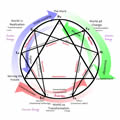The Reactional Tsunami
2015-03-02
The public news stream is nothing short of a Reactional Self tsunami. These days every news organization, blogger, even the weather channel outdoes itself to sensationalize the news and attract the attention of the Reactional Self. Once in a while the bizarre nature of this phenomenon is actually noticed, as in this post from The Daily Beast:
By now, probably the only person in the universe not up to speed on the color of a dress that ate the web last week is the late Boris Nemtsov. He was the political opponent of Putin who was assassinated in Moscow a few days ago, shot dead on a bridge within sight of the Kremlin.
The debate over the color of a dress caused millions—millions—to nearly break BuzzFeed. Brain surgeons, ophthalmologists, politicians, famous actors, cab drivers, waitresses, schoolteachers, and nearly everyone with an iPhone threw down an opinion.
There are a lot of reasons why this occurred. The primary reason, of course, is simple: There is basically no live sports programming on TV to attract us between the Super Bowl and opening day of the baseball season, so our days and lives seem long and empty. Another might be that we have morphed into a nation glutted with the bored as well as those who think constantly tweeting means you have lots of friends who think alike.
I must admit that even with multiple links and references to this, now famous, dress controversy, I have intentionally avoided even trying to find out what it is that I'm ignoring. But this constant pull from all sides, personal and public, is something that we have to take seriously.
There are three main sources for this “pull” to involve ourselves in the useless activity of “reacting”. Briefly they are:
- Our own internally generated ‘sensationalism’ of likes and dislikes, attractions and aversions, opinions, agreements, disagreements…the list is nearly endless
- Interactions with our nearest and dearest family, friends and colleagues
- Our society, mainly in the form of the internet, television, sports, politics, religion, and so on.
Our task, our challenge really, is to skillfully interact with each of these temptations to react such that we not only avoid Reaction, but exit the event having gained something from the exchange. There are a few things that are common to all of these situations, and a few things that we need to know that are unique to each.
One of the most important common elements is that every “pull” is trying to extract energy from us. All of the political, religious, sports, news, Facebook pages, twitter accounts, family, colleagues, inner likes and dislikes, etc. want some combination of time, attention, energy, money, support, information, recommendation, connection and so on from us. With very few exceptions none of them want us to consciously reason, think or feel either about the objective merits of giving our energy to them, or the objective benefit to ourselves from giving them our energy.
It should be noted that this harvesting of energy, the pull, is not in and of itself a bad thing. Everything in our environment survives by pulling in a net surplus of energy. Anything that experiences a net loss of energy over a long enough period of time will go out of existence. This applies to political parties, businesses, religions, people, stars, feelings, habits, likes and dislikes, and anything else that exists under the laws of space and time.
There are a number of other common elements, but we’ll move on to considering some of the unique elements for each of the three situations.
Society: We certainly ‘owe’ something to our society, but we can’t repay that debt by unconsciously adding to the Reactional tsunami that already exists. So for the most part political activity, religious fervor, excessive enthusiasm about sports teams, and so on is usually a net loss of energy for us (despite the momentary experience to the contrary), and feeds energy to entities that generally work against the best interests of society. To put it more precisely, the unique aspect of entities in our society is that they are too big for us to have much influence on their basic nature, and our personal energies are likely better used for our own personal aims.
Friends, Family, and Lovers: Here the unique aspect is that we can and do have an influence, but exactly how we influence the situation makes all the difference. If we simply react to the Reactional Self manifestations of our friends and family, either through agreement or disagreement, we end up confirming and deepening the destructive nature of the Reactional Self. At first this may be hard to see, but later it will be hard to miss. However, even if we see it, it still remains difficult not to get sucked into the Reactional pattern. One method for avoiding this is to identify the legitimate energy needs; emotional, physical, mental or sexual; that our near and dear ones are trying to fill, and then to give energy to those legitimate needs, but to do this through bypassing the mechanism and manipulation of the Reactional Self.
Personal: Our own habits, conditioning, likes and dislikes and so on also need reinforcing energy to maintain themselves. But the unique aspect of these elements is that unlike society or ‘others’, these elements are ours to feed or starve as seems appropriate.
In all of these cases, we will need to extract ourselves from the ‘soup’ of Reaction to make any kind of positive contribution.
Tomorrow we’ll try to describe the methods and disciplines needed to exit these Reactional exchanges with a ‘profit’.
- John Hutcherson's blog
- Log in to post comments

Comments
true, but what about enemies?
They are out there. And it seems to me that dealing with them is more than a matter of simply manifesting appropriately.